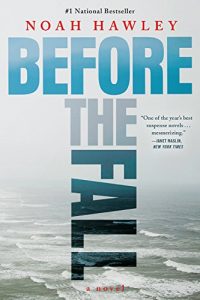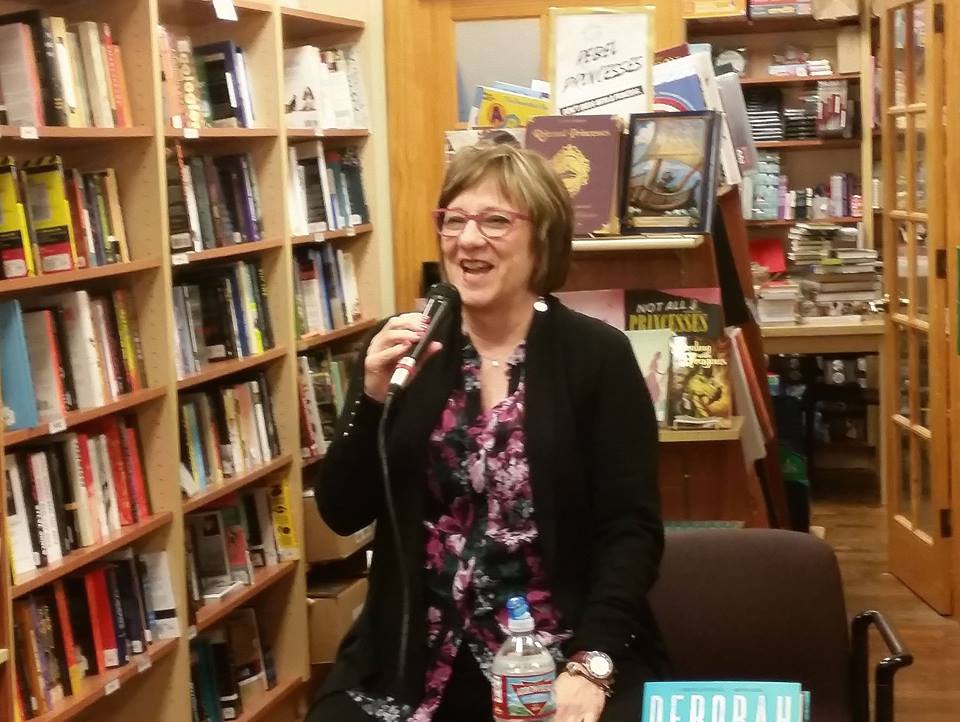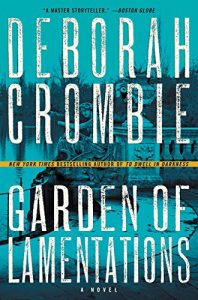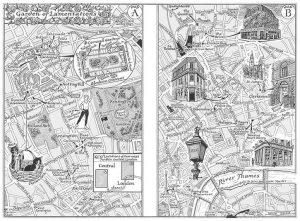Before the Fall by Noah Hawley
The Book Barmy reading list has adapted to the past couple of months of endless rain and a bout with the flu. I gravitated toward thrillers, wanting plot driven, hold your attention type escapism – as if I were on a long, mind-numbing plane trip
As with Dark Matter, Mr. Hawley, the author of Before the Fall is an award winning television writer, most famous for the strange but compelling series Fargo, so I hoped I was in for gripping story line.
Before the Fall bit me hard from the start and didn’t let go.
A private jet crashes minutes after departing Martha’s Vineyard. Just two passengers survive, an artist and a 4 year old boy. With J.J., the boy in tow secured to a seat cushion, the middle-aged painter Scott Burroughs swims across the ocean to the Long Island shore. Turns out Scott is an accomplished swimmer, inspired as a young boy witnessing Jack LaLane swim from Alcatraz to San Francisco.
The mystery of why the plane crashed is told by weaving together the crash investigation and the survivors aftermath with the backstories of the deceased passengers and crew members. The flight recorder reveals nothing amiss with the plane and it is decided that the crash was due sabotage. A classic locked room mystery, but up in the air. The mystery is unwrapped by revealing each character’s personal history and point of view.
The deceased include a financier facing federal indictment and his clueless wife; the head of a Fox-like cable news network with his wife and child; an Israeli bodyguard haunted by war; a career pilot; a hotshot co-pilot; and a flight attendant in her own life crisis.
In the aftermath of the crash, Mr. Hawley gives center stage to Bill Cunningham the larger-than-life newscaster for the cable news network. He makes the story of the plane crash and the network’s lost leader tabloid news — by asking leading questions, ignoring the facts, assuming the worst, and using illegal means to get information.
It was fascinating to see how the news was no longer the facts of what happened, it became a “story” presented to make the headlines and grab audience numbers. I cringed as Cunningham digs into the personal life of the hero, Scott Burroughs, using a hacker to monitor his private activities, which Cunningham then announces in his news broadcasts.
All this a thinly veiled, yet very relevant stab at tabloid media and Fox news
Cunningham was the angry white man people invited into their living rooms to call bullshit at the world . . . who told us what we wanted to hear, which was that the reason we were losing out in life was not that we were losers, but that someone was reaching into our pockets, our companies, our country and taking what was rightfully ours.
[He appealed to] the people who had been searching their whole lives for someone to say out loud what they’d always felt in their hearts.
Just when the mystery of the downed plane seems connected to the corrupt financier, or perhaps the mysterious bodyguard — no no, it must be connected to the news network somehow– the story line shifts to the characters’ blurred boundaries and questionable pasts. The characters, are after all, just humans – fraught with guilt, frailties, and unresolved resentments.
In the end, it’s not money or power, but human vulnerabilities which drive our actions.
Before the Fall reads like a film — it was a fast paced, entertaining and exciting thriller. And what do you know? Sony Pictures has acquired the rights to the story.
A digital advanced readers copy was provided by Grand Central Publishing via Netgalley.
The Portable Veblen by Elizabeth McKenzie
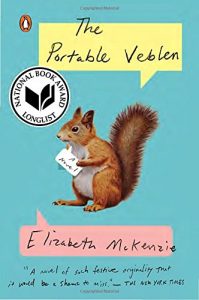 The Portable Veblen was a National Book Award nominee, a Bailey’s prize finalist and talked about on NPR. I found I had an advance copy — and gave it try…especially after reading the book’s publicity blurbs.
The Portable Veblen was a National Book Award nominee, a Bailey’s prize finalist and talked about on NPR. I found I had an advance copy — and gave it try…especially after reading the book’s publicity blurbs.
“A delightfully cockeyed love story that enfolds two splendidly dysfunctional families and a winningly persistent squirrel.”
“No matter how many novels you’ve read, it’s safe to say you’ve never read a novel like The Portable Veblen.”
The main character, Veblen Amundsen-Howda was named after Thorstein Veblen, an early twentieth century economist who despised corporations, materialism, and the consumer class – a sort of Norwegian Henry Thoureau.
Okay, once I had that figured out, I carried on reading.
Our Veblen is plagued by a hypochondriac, verbally abusive mother. Her father is in a mental institution. There’s a stepfather who suffers from PTS. And Veblen herself has a bizarre obsession with squirrels. She talks to squirrels, convinced they’re the only ones who care and understand her life situation.
A few more chapters and we discover that Veblen bites her own arm in times of stress, there’s a strangulation attempt, and the final straw — attempted humor around the abuse of a disabled child.
Had there been a fire in the fireplace I would have burned the thing* — so instead I threw The Portable Veblen on the floor in disgust.
I was forewarned that there would be family dysfunction – (see the blurbs above)…
But these characters go beyond dysfunctional — they are nasty pieces of work and season ticket holders on the crazy train.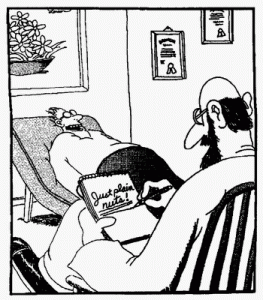
And, my friends, child abuse is never, ever funny.
* When I was a little girl, there was a famous incident in which, disgusted with what he was reading, my grandfather threw the errant book across the room into the fireplace.
Had we had a fire that evening —
I Would Have Done The Same.
Deborah Crombie
Did you ever have one of those evenings? It’s already dark, it’s raining, and you’re cozy, cuddled into your favorite chair, slippers on,– hunkered down for the night.
The last thing you want to do it go out, but…you have something you really want to see, a thing you really want to do. So back and forth you argue with yourself ~~ should I go or should I stay?
Tuesday night, my neighborhood independent bookstore was hosting a talk by Deborah Crombie. She was promoting her newest book, Garden of Lamentations, which I loved.
So I pulled myself together, put on some decent clothes, my raincoat and boots. Made myself a travel mug of tea and ventured out in the storm.
So glad I did.
Ms. Crombie was very open and funny. She’s a native Texan and she told how she unexpectedly fell in love with England – especially London, how on a trip to England, she stumbled into a place that would make a perfect setting for a mystery. Then, in a lovely self-depreciating manner, she described how she taught herself to write mystery novels by deconstructing her most admired British authors — P.D. James, Reginald Hill and Dorthy Sayers.
Ms. Crombie glossed over what must have been really hard work — long hours of writing through many drafts, author tutorials, writer workshops, university courses, and endless networking — other wannabe writers throw in the towel at even half this workload.
I came away with a signed book for a fellow Crombie fan/friend and a resolution to read Dorothy Sayers and Reginald Hill– whom, somehow, I’ve never read.
A very nice evening – and to think I almost stayed home in my slippers.
The $64 Tomato by William Alexander
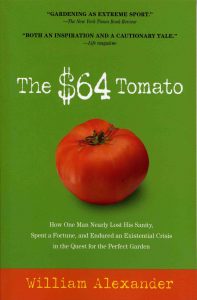 I’ve been perusing seed catalogs for our four little vegetable beds. Despite our summer fog, our little garden gives us fresh lettuce, peas, greens and herbs most of the year. Once we get our first taste of our own garden salad made from heirloom lettuces and organic herbs, we decide it’s all worth it. Be damned the slugs, the mold from the fog, the time, effort and mostly the cost.
I’ve been perusing seed catalogs for our four little vegetable beds. Despite our summer fog, our little garden gives us fresh lettuce, peas, greens and herbs most of the year. Once we get our first taste of our own garden salad made from heirloom lettuces and organic herbs, we decide it’s all worth it. Be damned the slugs, the mold from the fog, the time, effort and mostly the cost.
So, with visions of fresh peas and lettuce dancing in my head, I picked up this slim little book, sitting on my shelf for years now. The $64 Tomato is for gardeners and wannabe gardeners alike — and the subtitle says it all:
How One Man Nearly Lost His Sanity, Spent a Fortune, and Endured an Existential Crisis in the Quest for the Perfect Garden
This is a unvarnished, honest look at what it means to maintain a garden when everything seems against you, and your dreams and plans vastly outrun the available time. But, like all hopeful gardeners, Mr. Alexander gamely plows ahead. (pun intended, couldn’t resist — I’m here all week, tip your waitress)
I laughed my way through this quirky memoir, reading about Mr. Alexander’s 2,000 sq. foot Hudson Valley vegetable garden, a fruit tree orchard and even his attempts to recreate a Swiss-style wildflower meadow on the property.
There’s a spooky handyman who bears a striking resemblance to Christopher Walken, a crew of exasperating contractors, and a menagerie of groundhogs, deer, Japanese beetles and crop destroying worms. These pests, both insect and mammal, defy Mr. Alexander at every turn. They come, they see his garden, and they conquer. His efforts to eradicate those pests (and yes, eradicate means exactly what you think) involve a mean 6,000-volt electric fence (really?) and harken back to that male-favorite film Caddyshack.
But throughout, we do see that Mr. Alexander does actually recognize the joy from his efforts:
Gardening is, by its very nature, an expression of the triumph of optimism over experience.
You gotta feel for this guy, there are the vacations that had to be planned around the harvest, the near electrocution of the tree man, the limitations of his middle-aged body, and the judgment of his wife and kids.
Mr. Alexander’s cost-benefit analysis included every cost — from seed ordered by the pound, to the live animal traps and then amortizing it over the entire life of his garden — results in a staggering $64* to grow each of his prized Brandywine tomatoes. (They sound wonderful, nothing like a homegrown tomato – but yes $64 seems extraordinary.)
But as any gardener will tell you, the pleasure of growing fresh food for friends and family — well that’s priceless.
*Another reviewer (obviously an economics major) pointed out that Mr. Alexander puts the entire costs of his garden on the poor tomato. This reviewer suggested he should have evaluated all crops at market value, taken that number and subtracted it from total expenditures, and then use the difference as a percentage of total expenditures to be applied as a markup percentage to the market value of the Brandywines equally with other crops.
In other words — don’t blame the tomato.
Mr. Alexander has also written several other books…all revealing his obsessive tendencies. I plan on reading both of these next:
52 Loaves in which our hero attempts to recreate a perfect loaf of bread from scratch: growing, harvesting, winnowing, threshing, and milling his own wheat, and
Flirting with French: How a Language Charmed Me, Seduced Me, and Nearly Broke My Heart. Mr. Alexander’s struggle to master a foreign language after age 50.
I like this guy, he’s my sort of geek, obsessive yet funny — outlandish, yet self depreciating. I would love to chat an afternoon away with him – preferably in the garden.
So, Mr. Alexander, if you’re reading this, you have an open invitation to stop by for a cup of coffee — or perhaps a salad — you can bring the tomatoes.
Garden of Lamentations by Deborah Crombie
You’ll want to plan a stop at your local independent bookstore on your way home, because Garden of Lamentations, Deborah Crombie’s latest mystery novel, is out today. Trust me on this one, have I ever steered you wrong?
As you know from THIS POST, I am a big fan of Ms. Crombie’s work. However, we have grown despondent here at Book Barmy, it’s been practically three years since the last installment of Ms. Crombie’s mystery novels set in London.
A very long (endless really) time to wait*.
Despite this time apart, upon opening Garden of Lamentations it was like meeting old friends and picking up where you left off. Duncan and Gemma are still in their cozy home with their chaotic, blended family. There are still pets underfoot and their delightful, busy life as parents is once again superimposed with murder and crime.
While things have never been easy for this high-powered police couple, their strong relationship always balances their career stresses. In this 17th installment however, we detect early on there’s an unusual tension between Detective Chief Inspector Kincaid and Detective Inspector Gemma James.
Duncan is secretive and distant as he investigates a series of presumably unrelated cases, involving a long ago undercover group of police, a racial hate killing and continues to try and understand why he was transferred . His investigation uncovers a former commander’s secrets and underlying corruption at highest levels of the Met.
Ms. Crombie’s setting is in Gemma’s and Duncan’s own London neighborhood of Notting Hill. A young nanny is found dead under a bower** and Gemma is called in to investigate this murder in a private locked garden for a block of homes off Kensington Park Road.
If you are not familiar with locked gardens of London, they are open only to the residents backing up and surrounding the garden. These gardens are enjoyed and often maintained by the residents. (Many a time I’ve longingly peeked through the gates of these wonderful London oasis’s.)
 Through multiple viewpoints we follow Gemma and Duncan through their individual cases, but especially with Duncan’s private investigations, I struggled to recall certain events from the previous two novels. But, as I read on, Ms. Crombie excels at weaving her plots together and most of my questions were answered.
Through multiple viewpoints we follow Gemma and Duncan through their individual cases, but especially with Duncan’s private investigations, I struggled to recall certain events from the previous two novels. But, as I read on, Ms. Crombie excels at weaving her plots together and most of my questions were answered.
It may have helped to revisit Ms. Crombie’s previous two – Sound of Broken Glass (#15) and To Dwell in Darkness (#16).
Once again, the flyleaf displays a hand drawn map of the book’s setting. I found myself examining the map to locate the pub where Duncan meets an old colleague or the spot where the local children have dance lessons.
This is one of the best in the series. There’s an engaging cast of Notting Hill neighbors, a locked garden mystery, and residents’ lies and secrets. We see the dark side of undercover police work and the repercussions of blurred lines between civilian and police life. Confessions and duplicity are revealed and some of the past can be put to rest. There is even a hint of a life change for Duncan and Gemma in upcoming installments.
As always, Ms. Crombie gives her readers absorbing mysteries combined with believable characters and fascinating London settings.
Garden of Lamentations was worth the wait.
Many thanks to Harper Collins/William Morrow for the opportunity to enjoy an advanced readers copy.
* I understand during this time there was a new grandchild for Ms. Crombie, which may have cut into her writing time.
** I had to look it up – a bower is a pleasant shady place under trees or climbing plants in a garden or wood.


